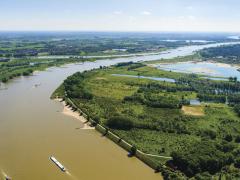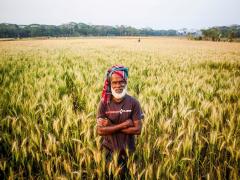Understanding equity perceptions of the half earth and sharing the planet’s scenario narratives
Equity is increasingly important in decision-making processes on biodiversity conservation, and relatedly agricultural development, but this dimension is hardly addressed in scenario development. In this study, the potential equity implications of two distinct future scenario narratives, the Half Earth and Sharing the Planet scenario, are assessed based on the perceptions’ of experts on environmental sciences and human development.
There are various understandings of how biodiversity should be conserved, and what the future of agricultural production should look like. The Half Earth (HE) and Sharing the Planet (SP) scenario narrative offer two distinct ways to envision these futures. The HE narrative focuses on protecting half the earth for nature conservation and agricultural intensification on the other half, while the SP narrative emphasises sharing landscapes between nature and people. Specific ideologies and measures associated with these scenarios are used in governance processes on different levels, such as in the negotiations of the Post-2020 Biodiversity Framework by the Convention on Biological Diversity (CBD). This makes the scenarios relevant and timely narratives.

Equity implications of the Half Earth and Sharing the Planet scenario
This study presents the perceived equity implications of the HE and SP scenario of 92 experts on environmental sciences and human development. Although equity is increasingly seen as a necessary condition for successful conservation, this dimension is hardly addressed in literature on these two scenarios. The results of this study show that equity implications are perceived to be larger in the HE scenario than in the SP scenario. But experts note that for both scenarios, implications will largely depend on the implementation.
Implications for scenario development and decision-making processes
This study has three implications. First, because equity considerations are increasingly relevant in policymaking, solution-oriented biodiversity and agriculture scenarios should address potential equity implications to remain relevant and useful for policymakers. Second, since respondents question the feasibility and equitability of implementing both scenarios, the relevance and credibility of the HE and SP scenarios for decision-making processes could benefit from addressing equity risks and barriers of implementation. Third, including equity in decision-making processes on biodiversity conservation and agricultural development requires a process that includes experts and stakeholders from various backgrounds, since equity perceptions can differ widely. Equity is a normative concept, shaped by worldviews and experiences, addressing equity thus requires dealing with normativity rather than avoiding it.
Authors
Specifications
- Publication title
- Understanding equity perceptions of the half earth and sharing the planet’s scenario narratives
- Publication date
- 8 November 2022
- Publication type
- Report
- Page count
- 26
- Publication language
- English
- Product number
- 4460




